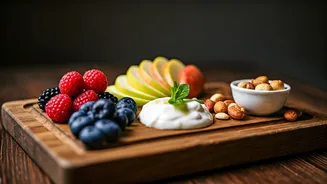Discover the Best Plant-Based Foods for Health! Dive into 8 Nutrient-Rich Choices for a Healthier Lifestyle
Namaste, readers! In today's world, many are looking to embrace a healthier lifestyle, and plant-based
eating is gaining massive popularity. It's not just a trend; it's a way to nourish your body with the goodness of Mother Nature.
Eating more plants can boost your health – increase your energy levels, protect against diseases, and contribute to a lighter environmental footprint. But with so many options available, where do you even start? Worry not!
We've compiled a list of eight nutrient-rich plant-based foods that are easily accessible and can be effortlessly incorporated into your daily diet. Let's explore these vibrant and healthy choices.
Leafy Greens: The Foundation of Vitality
Think of leafy greens as the unsung heroes of the plant kingdom. Spinach, kale, lettuce, mustard greens, fenugreek (methi) – these are nutritional powerhouses packed with vitamins, minerals, and antioxidants.
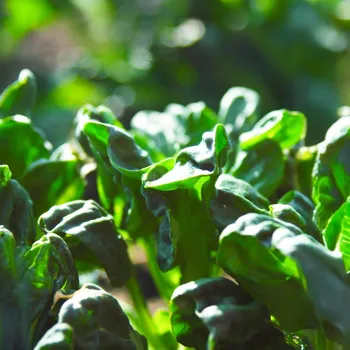
These greens are excellent sources of Vitamin K, crucial for blood clotting and bone health. They also provide Vitamin A, essential for vision and immune function, and Vitamin C, a powerful antioxidant that boosts immunity and protects against cell damage.
Adding even a small serving of leafy greens to your daily diet can reap significant benefits. Include spinach in your morning smoothie, add kale to your stir-fries, or create a fresh and flavorful salad with a mix of various lettuce types.
Don’t forget the Indian favorites like sarson ka saag or palak paneer (made with low-fat paneer, of course!). Remember to wash your greens thoroughly to remove any dirt or pesticides. Aim for at least two cups of leafy greens each day to reap the maximum health advantages.
They are also very low in calories, so you can eat to your heart's content! This makes them great for managing weight and keeping you feeling full and energized throughout the day.
Legumes: Protein Powerhouses from the Earth
Need a good source of protein that isn't meat? Look no further than legumes! This family includes lentils (masoor dal, toor dal), beans (rajma, chole), peas (matar), and chickpeas (chana). Legumes are not only rich in protein but also packed with fiber, iron, and folate.
Fiber helps regulate blood sugar levels, promotes healthy digestion, and keeps you feeling full, which aids in weight management. Iron is essential for carrying oxygen throughout the body, preventing anemia and fatigue. Folate is crucial for cell growth and development.
Incorporating legumes into your diet is surprisingly simple. Make a hearty dal for lunch or dinner, add chickpeas to your salads, or enjoy a flavorful rajma chawal. Try making a chana masala, a popular and delicious North Indian dish. Roasted chickpeas make a great snack!
Soak your legumes overnight to reduce cooking time and improve digestibility. You can also sprout them for even greater nutritional benefits. Sprouted mung beans, for instance, become even richer in vitamins and enzymes.
Legumes are also an affordable protein source, making them an excellent choice for budget-conscious individuals.
Berries: Sweet Treats with Powerful Antioxidants
Berries, those tiny bursts of flavor, are loaded with antioxidants. This includes strawberries, blueberries, raspberries, and blackberries. These colorful fruits are brimming with vitamins, minerals, and, most importantly, antioxidants which combat free radicals.
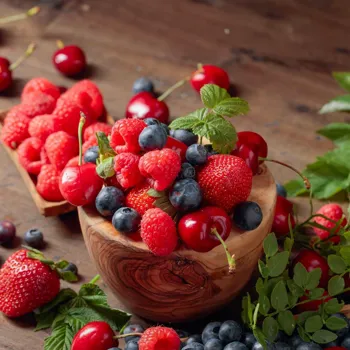
Free radicals are unstable molecules that can damage cells and contribute to aging and various diseases. Berries are a yummy way to remain healthy.
Antioxidants like anthocyanins give berries their vibrant colors and protect your cells from damage.
Berries are also relatively low in sugar compared to other fruits, making them a healthier sweet treat. Berries are also great sources of Vitamin C. Add berries to your morning cereal or oatmeal, blend them into a smoothie, or simply enjoy them as a refreshing snack.
You can even add them to your desserts for a healthier twist. Frozen berries are just as nutritious as fresh ones and are perfect for smoothies or baking. Remember to opt for organic berries whenever possible to minimize exposure to pesticides.
Nuts and Seeds: Healthy Fats and Essential Nutrients
Nuts and seeds are small but mighty sources of healthy fats, protein, fiber, vitamins, and minerals. Almonds, walnuts, cashews, chia seeds, flax seeds, sunflower seeds, and pumpkin seeds are excellent additions to a plant-based diet.
Healthy fats, like those found in nuts and seeds, are crucial for brain health, hormone production, and nutrient absorption. They also help keep you feeling satisfied, preventing overeating.
These snacks provide a good amount of energy and help with other health conditions.
Nuts and seeds are also rich in minerals like magnesium, zinc, and selenium, which play vital roles in various bodily functions. Add chopped nuts to your breakfast cereal, sprinkle seeds on your salads, or enjoy a handful of nuts as a midday snack.
You can add nuts to your Indian mithais for a healthier dessert. Nut butters, like almond butter and peanut butter (choose natural varieties without added sugar and oil), are also versatile and nutritious options.
Whole Grains: Energy and Fiber for Sustained Well-being
Whole grains, such as brown rice, quinoa, oats, whole wheat, and barley, are an important source of complex carbohydrates, fiber, and essential nutrients.
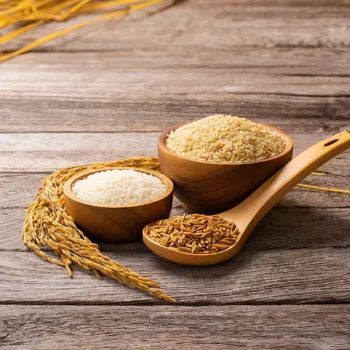
Unlike refined grains (like white rice and white bread), whole grains retain their bran and germ, which are packed with fiber, vitamins, and minerals. Complex carbohydrates provide a slow and steady release of energy, keeping you feeling full and energized for longer.
Whole grains are an essential to keep your body functioning properly.
Fiber helps promote healthy digestion, regulate blood sugar levels, and lower cholesterol levels.
Incorporate whole grains into every meal by opting for brown rice instead of white rice, choosing whole wheat bread over white bread, and adding oats to your breakfast.
You can make a delicious and healthy khichdi with brown rice and lentils, or prepare a hearty bowl of oatmeal with fruits and nuts. Try experimenting with different whole grains like quinoa and barley in your salads and soups.
Colorful Vegetables: A Rainbow of Health
Eating a variety of colourful vegetables – red bell peppers, carrots, purple cabbage, yellow squash, green broccoli – ensures that you are getting a wide range of vitamins, minerals, and antioxidants. Each color represents different phytonutrients, which have unique health benefits.
These colourful veggies are very good for your body and mind. They provide different nutrients for different uses.
For example, red vegetables like tomatoes and red bell peppers are rich in lycopene, an antioxidant linked to a reduced risk of certain cancers.
Orange vegetables like carrots and sweet potatoes are excellent sources of beta-carotene, which the body converts into Vitamin A, essential for vision and immune function. Green vegetables, as mentioned earlier, are packed with vitamins, minerals, and antioxidants.
Aim to fill half your plate with vegetables at every meal. Roast them, stir-fry them, steam them, or enjoy them raw in salads. Don’t be afraid to try new vegetables and experiment with different cooking methods to find your favorites.
Tofu and Tempeh: Plant-Based Protein Superstars
Tofu and tempeh, derived from soy, are excellent sources of plant-based protein. Tofu, made from curdled soybean milk, has a mild flavour and readily absorbs the flavours of other ingredients. Tempeh, made from fermented soybeans, has a nutty flavour and a firm texture.
They are a great alternative to meat and other high protein options. They are also great for building muscle.
These options are not only high in protein but also contain all nine essential amino acids, making them complete protein sources.
Tofu and tempeh are also rich in iron, calcium, and other essential nutrients. Tofu and tempeh are incredibly versatile! They can be used in stir-fries, curries, salads, and even desserts.
Marinate tofu with your favorite spices before grilling or baking, or crumble tempeh and use it as a ground meat substitute in your favorite recipes. Add tofu or tempeh to an Indian curry for a protein-rich twist.
Avocados: Creamy Goodness with Healthy Fats
Avocados are unique fruits that are loaded with healthy monounsaturated fats. These fats are beneficial for heart health, helping to lower bad cholesterol levels and raise good cholesterol levels. They also promote brain health and reduce inflammation.
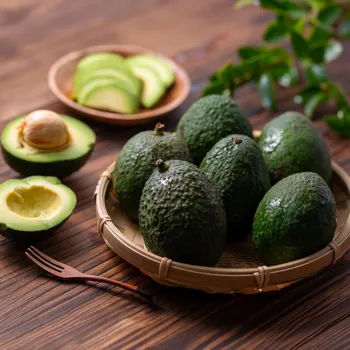
Eating avocados on a regular basis is an excellent way to improve your health.
Avocados are also great sources of fiber, potassium, and vitamins C, E, and K. Add sliced avocado to your salads, sandwiches, or toast. You can also make guacamole, a delicious and healthy dip.
Mash avocado and use it as a spread instead of butter or mayonnaise. Avocados are surprisingly versatile and can be incorporated into both sweet and savory dishes. Make sure you consume avocados in moderation, as they're high in calories.
Incorporating these eight nutrient-rich plant-based foods into your diet is a great way to boost your health and well-being. Remember to eat a variety of foods, listen to your body, and consult with a healthcare professional or registered dietitian for personalized dietary advice.
Embrace the power of plants and enjoy a healthier, happier you!
AI Generated Content. Glance/InMobi shall have no liability for the content


